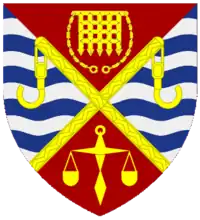Elwyn Jones, Baron Elwyn-Jones
Frederick Elwyn Elwyn-Jones, Baron Elwyn-Jones,[1] CH, PC, QC (24 October 1909 – 4 December 1989), commonly known as Elwyn Jones, was a Welsh barrister and Labour politician.
The Lord Elwyn-Jones | |
|---|---|
.jpg.webp) Elwyn-Jones in 1976 | |
| Shadow Lord Chancellor | |
| In office 2 October 1983 – 9 January 1989 | |
| Leader | Neil Kinnock |
| Preceded by | Position established |
| Succeeded by | The Lord Mishcon |
| Lord High Chancellor of Great Britain | |
| In office 4 March 1974 – 4 May 1979 | |
| Prime Minister | Harold Wilson James Callaghan |
| Preceded by | The Lord Hailsham of St Marylebone |
| Succeeded by | The Lord Hailsham of St Marylebone |
| Attorney-General for England | |
| In office 16 October 1964 – 19 June 1970 | |
| Prime Minister | Harold Wilson |
| Preceded by | John Hobson |
| Succeeded by | Peter Rawlinson |
| Member of the House of Lords Lord Temporal | |
| In office 11 March 1974 – 4 December 1989 Life peerage | |
| Member of Parliament for Newham South (West Ham South, 1950-1974) (Plaistow, 1945-1950) | |
| In office 5 July 1945 – 11 March 1974 | |
| Preceded by | Will Thorne |
| Succeeded by | Nigel Spearing |
| Personal details | |
| Born | Frederick Elwyn Jones 24 October 1909 Llanelli, Wales |
| Died | 4 December 1989 (aged 80) Brighton, England |
| Political party | Labour |
| Spouse | |
| Children | 3 (including Dan) |
| Alma mater | University of Wales, Aberystwyth Gonville and Caius College, Cambridge City Law School |
Background and education
Elwyn Jones was born in Llanelli, Carmarthenshire, and read history for a year at the University of Wales, Aberystwyth, and then at Gonville and Caius College, Cambridge. He spent time in Germany in the 1930s.
An acting bombardier in the Royal Artillery (Territorial Army), he was commissioned as a second lieutenant on 23 December 1939.[2] He ended his service as a major.
Legal career
Jones became a barrister and Recorder of Merthyr Tydfil. He was also a broadcaster and journalist. He served as junior British Counsel during the Nuremberg Trials,[3] and led for the prosecution (Leading Prosecutor) at the Hamburg trial of Marshal Erich von Manstein in 1948. He was appointed Queen's Counsel in 1953.[4]
In 1966, he led the prosecution of the Moors murderers, Ian Brady and Myra Hindley.
Political career
At the 1945 general election, he was elected as Labour Member of Parliament for Plaistow, east London. In 1950, he became MP for West Ham South, serving until 1974. In 1964, Elwyn Jones was sworn of the Privy Council and appointed Attorney General (receiving the customary knighthood[5]) by Harold Wilson, a post he held until 1970.
In February 1974, he was once again elected to Parliament, now for Newham South, but left the House of Commons soon afterwards when he was made a life peer. On 11 March, he was created Baron Elwyn-Jones, of Llanelli in the County of Carmarthen and of Newham in Greater London, with a change of his surname to Elwyn-Jones.[1] The resulting by-election allowed Nigel Spearing to re-enter Parliament as he had lost the Acton seat in the February election. He served as Lord Chancellor from 1974 to 1979, under Harold Wilson and James Callaghan. In 1976 he was made a Companion of Honour.[6]
Personal life
In 1937, Jones married Pearl "Polly" Binder, an artist from Manchester. The couple had three children: Josephine, Lou and Dan. Josephine became a researcher on Jacob Bronowski's TV series The Ascent of Man and married Francis Gladstone (a great-grandson of Prime Minister William Gladstone).[7] Dan Jones is an artist, collector of children's playground songs and human rights campaigner.
Elwyn-Jones's brother Idris (1900–1971) was captain of the Wales rugby union team in 1925, and was an industrial chemist who became Director General of Research Development for the National Coal Board.[8][9]
Elwyn-Jones died in December 1989, aged 80.[10]
Arms
  |
|
References
- "No. 46236". The London Gazette. 14 March 1974. p. 3303.
- "No. 34758". The London Gazette (Supplement). 22 December 1939. p. 8535.
- The Trial of German War Criminals, Part I. His Majesty's Stationery Office. 1946. p. vii.
- "No. 39827". The London Gazette. 17 April 1953. p. 2119.
- "No. 43498". The London Gazette. 24 November 1964. p. 10025.
- "No. 46916". The London Gazette. 1 June 1976. p. 7823.
- Elwyn-Jones, Frederick Elwyn-Jones, Baron, 1909-1989. (1983). In my time : an autobiography. London: Weidenfeld and Nicolson. ISBN 0-297-78159-6. OCLC 10265408.
{{cite book}}: CS1 maint: multiple names: authors list (link) - James, Mary Auronwy. "JONES, WALTER IDRIS (1900–1971)". Dictionary of Welsh Biography. National Library of Wales. Retrieved 20 November 2014.
- "Wales' rugby captains". BBC. 26 October 2010. Retrieved 20 November 2014.
- Charles Roger Dod; Robert Phipps Dod (1990). Dod's Parliamentary Companion. Dod's Parliamentary Companion, Limited. p. 348. ISBN 9780905702162.
- "Lord Chancellors, printed paper office corridor (6)". Baz Manning. 11 April 2011. Retrieved 28 January 2021.
Further reading
- The Times House of Commons 1945. 1945.
- The Times House of Commons 1950. 1950.
- The Times House of Commons 1955. 1955.
External links
- Elwyn Jones, Baron Elwyn-Jones at Find a Grave
- Portraits of Elwyn Jones at the National Portrait Gallery, London
- Llanelli Community Heritage Elwyn-Jones Blue Plaque
- Lord Elwyn-Jones' appearance on Desert Island Discs
- Lord Elwyn-Jones Papers at the National Library of Wales
- Hansard 1803–2005: contributions in Parliament by Lord Elwyn Jones
_(2022).svg.png.webp)
.svg.png.webp)